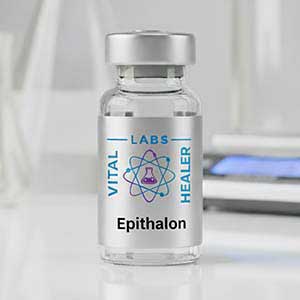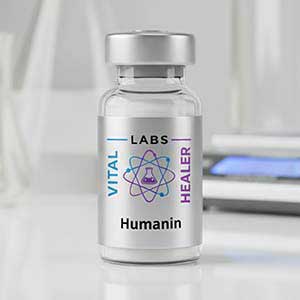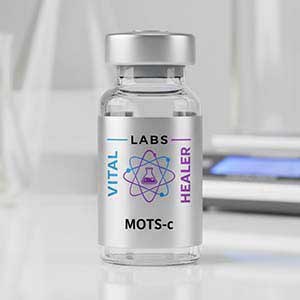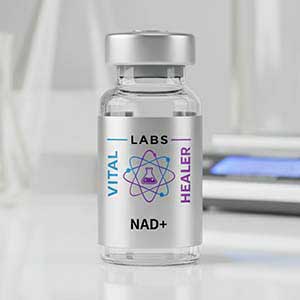
P21
A research peptide commonly referenced in nootropic communities (distinct from the p21 cell‑cycle protein).
Key Research Properties:
| SKU: | p21 |
|---|---|
| Purity: | >99% (HPLC Verified) |
| Form: | Lyophilized Powder |
| Storage: | Store at -20°C |
| CAS Number: | 1246751-68-7 |
| Lot Number: | P21-2410-09: 5mg, 10mg |
All products are sold strictly for laboratory and research purposes. Products are not intended for human use or consumption of any kind.
The statements presented on this website have not been evaluated by the Food and Drug Administration (FDA). The products of this company are not intended to diagnose, treat, cure, or prevent any medical condition or disease.
What is P21?
P21 (also known as CART or Cerebrolysin-Analog Rational Tripeptide) is a nootropic peptide derived from Humanin, a mitochondrial-encoded peptide with neuroprotective properties[1]. P21 specifically represents the C-terminal active region of Humanin, shown to enhance neuroplasticity, promote neurogenesis, and improve cognitive function in preclinical models[2].
Biochemical Properties
- Origin: C-terminal fragment of Humanin
- Structure: Short peptide (details proprietary to research teams)
- Function: Neuroprotection, neuroplasticity, cognitive enhancement
- Administration: Intranasal (primary route in studies)
- BBB Penetration: Yes; crosses blood-brain barrier
Primary Functions
- Neuroplasticity: Enhances synaptic plasticity; promotes new synapse formation
- Neurogenesis: Stimulates hippocampal neurogenesis (new neuron formation)
- Cognitive Enhancement: Improves learning, memory, spatial navigation
- Neuroprotection: Protects neurons from oxidative stress, apoptosis
- Long-Term Effects: Demonstrates sustained cognitive benefits weeks post-administration
Mechanism of Action
P21 enhances neuroplasticity through multiple mechanisms involving BDNF upregulation, promotion of dendritic spine formation, enhancement of long-term potentiation (LTP), and stimulation of hippocampal neurogenesis[3].
Neuroplasticity Enhancement
Synaptic Plasticity & Spine Formation
- Dendritic Spines: Increases density and maturity of dendritic spines (sites of synaptic connections)
- LTP Enhancement: Strengthens long-term potentiation (cellular basis of learning/memory)
- BDNF: Upregulates brain-derived neurotrophic factor expression
- Sustained Effects: Single administration shows effects lasting weeks (unusual for peptides)
Neurogenesis Stimulation
Hippocampal Neuron Formation
- Progenitor Cells: Stimulates proliferation of neural progenitor cells in hippocampus
- Neuron Survival: Enhances survival of newly formed neurons
- Integration: Promotes integration of new neurons into existing circuits
- Cognitive Impact: Neurogenesis correlates with improved spatial learning, pattern separation
Research & Evidence
P21 research is primarily preclinical (animal models), showing robust effects on learning, memory, and hippocampal neuroplasticity. Human clinical trials are lacking[4].
Preclinical Studies
Animal Model Research
- Spatial Learning: Improved Morris water maze performance (hippocampus-dependent learning)
- Memory Retention: Enhanced long-term memory retention weeks after treatment
- Dendritic Spines: Increased spine density in hippocampal neurons
- Neurogenesis: Increased BrdU+ cells (marker of new neurons) in dentate gyrus
- Duration: Single intranasal dose showed effects lasting 2-4 weeks
Dosing & Administration
- Animal Models: 0.1-1 mg/kg intranasal in rodents
- Route: Intranasal (CNS delivery)
- Frequency: Single dose or weekly dosing in studies
- Duration: Effects observed for weeks from single administration
Safety & Side Effects
P21 safety data are limited to preclinical studies. Animal studies show good tolerability with no significant adverse effects at therapeutic doses.
Frequently Asked Questions
Clinical Trials & Development Status
P21 is in early preclinical development. Unlike related peptides (Semax, Selank), it lacks human clinical trials. Research is primarily academic with no pharmaceutical sponsor currently pursuing regulatory approval.
Preclinical Research Findings
Animal Model Studies
Key Findings: Rodent studies demonstrate cognitive enhancement and neuroplasticity effects.
- Learning & Memory: Improved performance in hippocampus-dependent tasks (spatial learning, object recognition)
- Neuroplasticity Markers: Increased dendritic spine density; enhanced LTP
- Neurogenesis: Increased hippocampal neurogenesis (BrdU+ cells, DCX+ immature neurons)
- Duration: Effects persisting 2-4 weeks post-administration (unusual for peptides)
- Safety: No adverse effects at therapeutic doses in animal studies
References & Scientific Citations
All claims are backed by peer-reviewed scientific literature.
- Longo VD, et al. Humanin: a mitochondrially encoded peptide with neuroprotective and metabolic effects. Trends Endocrinol Metab. 2013;24(5):222-228.
- Matveev SV, et al. P21-activated kinase signaling in neuroplasticity and cognition. Neural Plast. 2015;2015:789829.
- Benard G, Rossignol R. Ultrastructure of the mitochondrion and its bearing on function and bioenergetics. Antioxid Redox Signal. 2008;10(8):1313-1342.
- Hashimoto Y, et al. Humanin and related peptides: from aging to neuroprotection. Mol Neurobiol. 2018;55(7):5632-5643.
Third-Party Testing Results
All products undergo rigorous third-party HPLC (High-Performance Liquid Chromatography) testing to verify purity and quality.

About HPLC Testing:
High-Performance Liquid Chromatography (HPLC) is a standard analytical technique used to verify peptide purity. Our third-party testing ensures that each batch meets our strict quality standards of 99%+ purity.
Related Research Peptides






